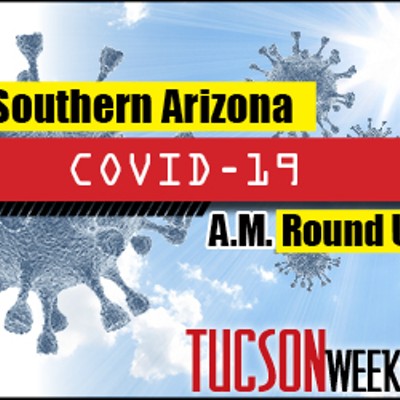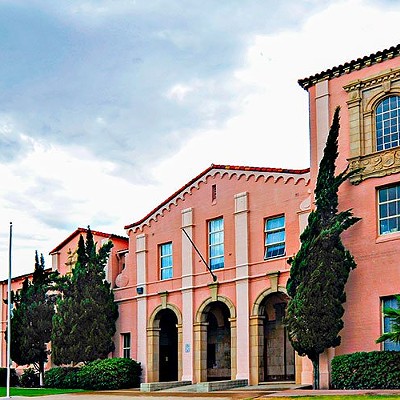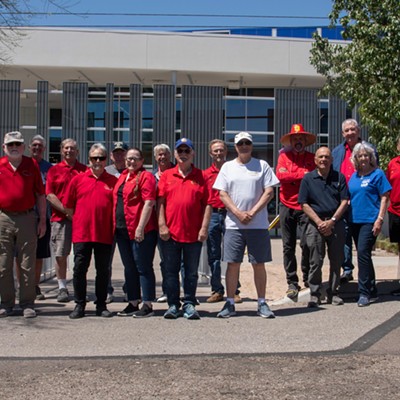It's 8:50 a.m. on a Friday, and this Cholla Magnet High School classroom starts filling up with students' chatter. Their professor, Corey Jones, greets each student one by one as they walk in—hand shakes, pats on the back.
Before the school announcements, Jones asks his kids to arrange their desks in a circle; that's the seatting chart of choice for his culturally relevant U.S. history from a Mexican-American perspective course. "Let's begin," he says. The young teacher starts clapping. His students join in, creating a crescendo. They call it, "the unity clap." It's how they begin and wrap up their lessons and discussions.
The teens—mostly but not entirely Chicanos and Chicanas—are enthusiastic to learn about the conquest, slavery, and all other tales of oppression and success that have occurred on American soil from the points of view of the victims and the victors.
From their mouths: This class makes me want to come to school.
Since Jan. 2, national, statewide and local magnifying glasses have been placed above this classroom, a few others at Cholla, some at Tucson and Pueblo high schools, and the entire Tucson Unified School District's culturally relevant curriculum.
Soon, as agreed upon by new state Superintendent of Public Instruction Diane Douglas, and TUSD Superintendent H.T. Sanchez, representatives of the Arizona Department of Education will be scheduling visits to these learning spaces, as the two entities try to fix alleged violations of A.R.S. 15-112, the 2010 law signed by former governor Jan Brewer that ended up outlawing the Mexican-American studies program two years later.
But this time, it's no longer the content that's on the black list; the tables have turned to how teachers like Jones have applied it in the classroom.
"ADE staff documented extensive evidence that the curricula have not been properly implemented in the classroom and lesson plans and materials do not reflect the new curricula. These deviations of the curricula are in violation of state law," said a statement from Douglas' office last week.
The immediate reaction: that's vague. Especially to Jones, who's had no ADE official ever visit his classroom to speak to him or his students—He turned over material he'd use in the course, and that's as far as the exchange went.
It's left Jones in a guilty-until-proven-innocent state of mind.
"When you work in this state, it's predictable. For me it wasn't a matter of 'if,' it was a matter of 'when,'" he says. "If (the content) runs counter to the narrative they have set up through a traditional historical ledge, it is very understandable, and from their perspective, this is dangerous, producing a counter narrative to dominate ideological and political positions. It is also a state that has attacked public education. It is a state that has embraced privatization, and prisons and schools have been a large part of that."
On his last day as state superintendent, John Huppenthal sent TUSD a notice of noncompliance, which among many other things highlighted Jones' use of Rage Against the Machine lyrics and a handout titled "Why was American slavery the most brutal in history?," arguing some of the district's culturally relevant classes—now also including English and history courses from an African-American perspective—were found to be promoting "the overthrow of the United States government, resentment toward a race or class of people," and "advocating ethnic solidarity instead of the treatment of pupils as individuals." The state, once again, threatened TUSD to cut its already crippled funding: 10 percent of monthly aid if the problems didn't disappear by March 4.
In the days that followed, Sanchez defended his district, curriculum, teachers and students.
Within days of stepping into office, Douglas agreed to meet with Sanchez. And, according to Sanchez, the 90 minute encounter in Phoenix went so well, Douglas appointed him to a Latino advisory committee, which will help infuse the state's version of the Common Core Standards with material showcasing Latino and Chicano contributions to the state and country.
"I don't feel that the state agency (Arizona Department of Education) wants to shut down our program, but wants to take a look at how we can work together and address any concerns," Sanchez said during a press conference at Utterback Magnet Middle School last Wednesday. He seemed optimistic about mitigating all disagreements in the next couple of months.
No, Douglas is not trying to kill the culturally relevant curriculum. But, let's remember the content itself is protected by the Desegregation and Unitary Status Plan. What's concerning to Jones is that the state is now red-flagging teaching methods and the use of certain tools—in Jones' case, the lyrics to Rage Against the Machine's "Take the Power Back"—that complement the material being taught.
"If they were to do a surprise visit in my classroom, they'd be incredibly disappointed," Jones says. He started teaching at Cholla this past fall semester. "They'd see a middle-aged Anglo with a positive relationship with the students in a respectful atmosphere, high-level academic, university-level work. When (the students) enter into a classroom with the understanding that 'I can academically achieve. I can identify with being an intellectual without having to sell out who I am,' that's empowering. Thinking (the students) are plotting the overthrow of the U.S. government, which is just completely absurd. To even conceptualize such an idea in your mind, it says a lot about these individuals."
If Huppenthal, Douglas and other officials were to personally meet Jones, they should probably think, "What an asset to our educational system." Here's a man with degrees in philosophy, political science and education, who's traveled through Central America, Africa, the Middle East and other corners of the world. He advocates for all students' success, for their pursuit of higher education, good jobs.
On this Friday morning, critical thinking is what makes its rounds from desk to desk. It's admirable to hear the young minds, how aware they are of their surroundings. And that should say something about Jones' teachings. "Get out there and participate in society, rather than sitting around watching Netflix all weekend." He's there to give the students multidimensional views that'll aid them in shaping their own understanding of the outside. The threat of that being taken away now looms.
Going around this circle discussion, the students feel the state is putting words in their mouths and ill thoughts in their minds.
"With my course, it's interesting Huppenthal calls us out, claims that we are promoting racial hatred, when the course is designed in a way that is looking to transcend that and go beyond that," Jones says.
The Los Angeles native is inspired by people like Lorenzo Lopez, who taught Mexican-American studies for eight years at Cholla until the program was dismantled more than two years ago. Lopez, who is now the head of TUSD's culturally relevant pedagogy, was one of the first people Jones met when moving to Tucson, and the reason Jones went to Cholla. In fact, many of Jones' pupils are former students of Lopez.
"Looking at dehumanization and the process of humanization, not just the humanization of you as someone who is struggling, but you have also humanized the opposition as well. To attack courses that are promoting these ideologies is absurd," Jones continues.
The possibility that he'll have to change the relationship with his kids, the way he speaks to them, being forced to influence an individualistic mind rather than the camaraderie he's implemented thus far, Jones says he'd feel like a hypocrite.
On Monday, the Ninth Circuit Court of Appeals heard arguments in the case brought forward by TUSD students Maya Arce, Korina Lopez and Nicolas Dominguez, challenging the constitutionality of the anti-Mexican-American studies law. They argued the law violates First Amendment rights and the right to equal protection, as well as that it is unconstitutionally overbroad and vague.
One of the minds behind the students' legal team, Anjana Malhotra, formerly a clinical teaching fellow at the Korematsu Center and now associate professor at SUNY Buffalo Law School, told the Tucson Weekly the court was bothered with the state enforcing the law despite having proof that the Mexican-American studies program had a positive effect on students.
"When there is a disproportionate impact on a minority Mexican-American community, and (this law) creates this disproportionate impact, how can that not be evidence of discriminatory intent?" Malhotra says during a phone call a few hours after leaving the courthouse. "They were concerned about student achievement. This was a program that helped Mexican Americans tremendously, the law was passed spite that. Equal protection claims are hard because you have to show intentional discrimination, but it works well here, because you have to show a law or government action was taken to single out a particular group, and that is exactly what this statute did."
It'll probably be some time before a resolution is known. And until that happens, changes are coming to TUSD. The school board is holding an executive meeting for legal advice next week to weigh in on their options.
Jones hopes an answer is here by at least May, so that he knows what to expect when he walks into Cholla come next school year.
"Without a doubt, data has shown that (Mexican-American studies) was incredibly successful. AIMS scores increased, graduation rates increased, college matriculation increased across the board. And its very success is what they see is so dangerous," he says. "That's something that I find challenging. The more successful my students are, the more criticism that is coming. Academically, as they improve, in the back of your mind you think, 'I'm going to be criticized more and more.'"













